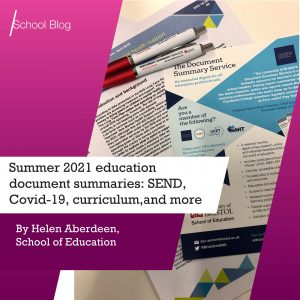 Blog by Helen Aberdeen, School of Education, University of Bristol
Blog by Helen Aberdeen, School of Education, University of Bristol
As the academic year draws to a close and school colleagues look forward to a well-earned (and desperately needed!) break, time to take a look back over the last 6 months in education through the lens of the Document Summary Service (to be known from September as the Education Policy and Research Service).
So…here are the Top Ten of most downloaded summaries:
Special Education Needs
Most of the ‘winning’ summaries fall within 3 themes, the first of which is Special Education Needs – always of interest to our subscribers. First place in the charts goes to a report from Ofsted which explores how the needs of children and young people are met in mainstream schools. Some interesting issues are highlighted, including the deployment of Teaching Assistants and concerns about SENCOs not having the capacity to fulfil the crucial role which they carry out. At number 5, a report from the Education Policy Institute which finds worrying disparities in terms of the identification of children with SEND – for example, the fact that attending school in a local authority area with high levels of disadvantage makes children less likely to be identified with SEND than children of similar backgrounds in more affluent areas.
Covid-19
The second theme in the Top Ten is, unsurprisingly, COVID-19. Ofsted’s Briefing on Schools reported on visits to 297 schools carried out in November 2020. Amongst concerns about ‘bubbles’ having to self-isolate and issues for pupils with SEND, there were some glimmers of hope such as the huge improvements in online learning and digital access. A report from the DfE looks at learning loss, using Renaissance Learning’s Star assessments. It finds that while learning loss has been pretty much universal, disadvantaged pupils and those in certain areas of England have been disproportionally affected. Another report form Ofsted shines a spotlight on remote education. A great overview of where schools are now with this and of some of the ongoing challenges!
Curriculum – subject-based reports
Our third theme is curriculum – three subject-based reports have made it into the Top Ten. A report from Cambridge Assessment is music to the ears of music departments – key findings about the positive effects for pupils of taking music GCSE. Ofsted’s research review of science, outlining the elements of a high-quality curriculum also made it into the Top Ten, as did a report from Renaissance Learning about what and how children are reading. Encouragingly, it points to evidence that children’s enjoyment of reading actually increased during the first lockdown.
Composite classes and English as an Additional Language, Proficiency in English, and Rates of Progression
The remaining 2 summaries in the Top Ten are no less important for not fitting neatly into one of my thematic boxes! The first is a report from the Nuffield Foundation and the Fraser Allen Institute which looked at the effect of composite classes (i.e., classes where pupils of different ages are taught together). No negative effect on attainment was found, either for the younger, nor for the older pupils, and younger pupils were actually found to benefit. The second report in this category is a report from Oxford University and the Bell Foundation investigating the relationships between English as an Additional Language (EAL), Proficiency in English (PIE), and educational achievement at school. In addition to presenting key findings, this report also provides a helpful overview of previous research – useful to anyone undertaking study of this area.
I look forward to ‘report mining’ next year so watch out for further blog updates. And if you don’t yet subscribe, do consider joining us!
Helen Aberdeen
Twitter: @BristolUniDocs
Top Ten Downloads from December 2020 to May 2021
No |
Organisation |
Title |
| 1 | Ofsted | Supporting SEND |
| 2 | Renaissance Learning | What and How Kids are Reading |
| 3 | DfE | Understanding Progress in the 20-21 Academic Year: Interim Findings |
| 4 | Fraser Allen Institute, University of Strathclyde | Composite Classes, Class Size and Human Capital Accumulation |
| 5 | Education Policy Institute | Identifying Pupils with Special Educational Needs and Disabilities |
| 6 | Ofsted | COVID-19 Series: Briefing on Schools November 2020 |
| 7 | Ofsted | Remoted Education Research |
| 8 | Cambridge Assessment | The Relationship Between Taking a Formal Music Qualification and Overall Attainment at Key Stage 4 |
| 9 | University of Oxford and the Bell Foundation | English as an Additional Language, Proficiency in English, and Rates of Progression |
| 10 | Ofsted | Research Review Series: Science |
